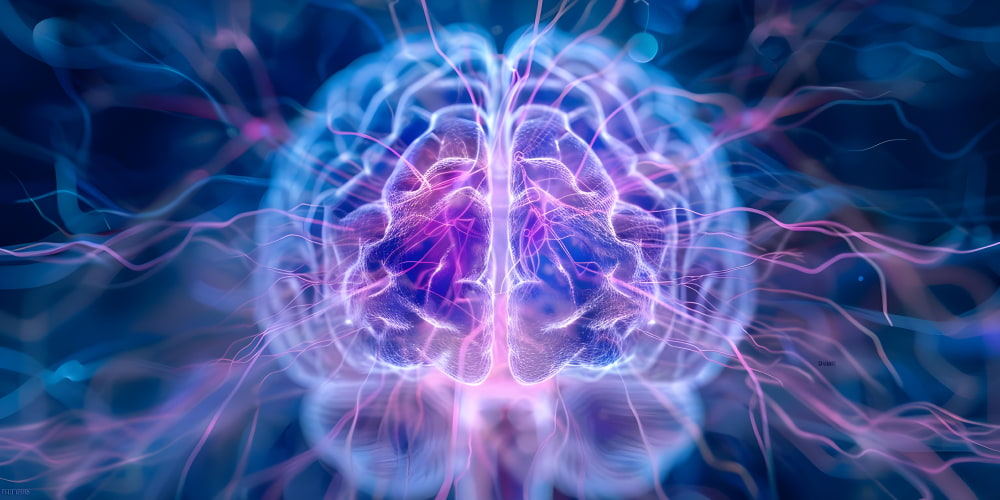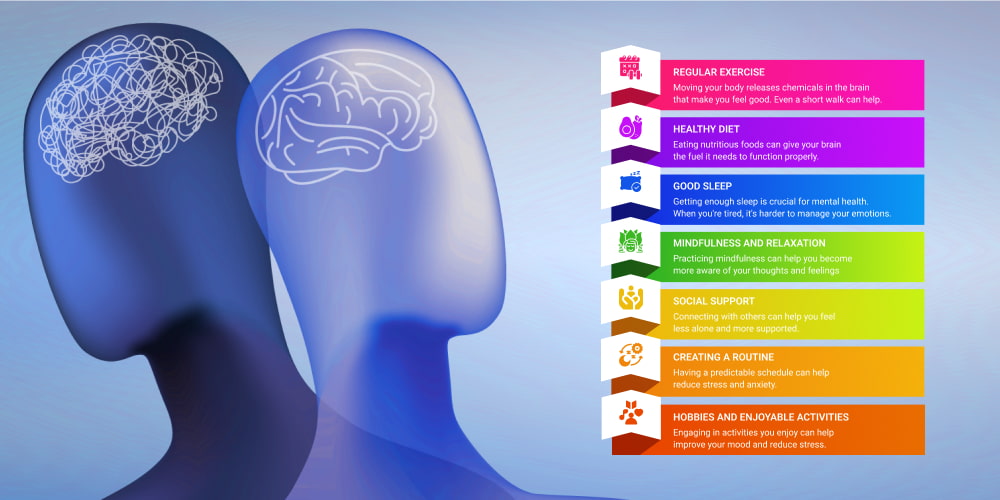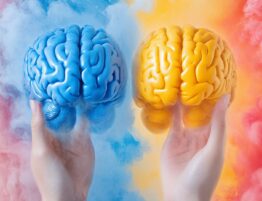Our brains are like busy control centers, helping us think, move, and feel. Sometimes, things go wrong in the brain, and these are called neurological disorders. These can be like a glitch in the system. When this happens, it can change how we feel and how we handle our emotions.
Imagine trying to drive a car with a broken steering wheel. It’s hard to control where you go. In a similar way, when parts of the brain don’t work right, it’s hard to control our feelings. This can make us feel sad, angry, or worried.
In this article, we will talk about how these problems can change our emotions and how this affects our mental health.
Understanding Neurological Disorders and Their Effect on Brain Function
Our brains are like complex computers, with many parts working together. Neurological disorders are like glitches in this computer system. They can change how the brain works, which can affect our feelings and actions. Examples include:
- Alzheimer’s Disease. This disorder slowly damages parts of the brain that help us remember things. It can make people forget names, places, and even loved ones.
- Parkinson’s Disease. This affects the parts of the brain that control movement. People with it might shake, have trouble walking, or move slowly. It can also lead to feelings of sadness and worry.
- Multiple Sclerosis (MS). This damages the protective covering around nerves in the brain and spinal cord. This can lead to problems with movement, feeling, and seeing.
When these disorders affect the brain, it can be hard for people to control their emotions. The parts for managing feelings might not work as well. This can make it difficult to stay calm or handle stress.
How Neurological Disorders Interfere with Emotional Responses
Our brains have special areas that help us understand and react to emotions. When a neurological disorder affects these areas, it can change how we feel and act.
For example:
- Someone with a brain injury might have trouble controlling their anger. They might get angry very quickly, even over small things.
- People with certain disorders might feel very sad or hopeless all the time. This is because the parts of their brain that control mood aren’t working right.
- Some people might show less emotion than before or have a “flat affect”. This could be due to damage in the parts of the brain that process emotional information.
These changes can make it hard for people to have normal relationships and do everyday things.
The Role of Emotional Regulation in Mental Health for Those with Neurological Disorders
Emotional regulation is like having a good control system for your feelings. It helps you stay calm, handle stress, and feel good. For people with neurological disorders, emotional regulation is very important for their mental health.
When someone has a neurological disorder, they might have a harder time controlling their emotions. This can lead to psychological impacts such as:
- Mood swings. Feeling very happy one minute and very sad the next.
- Anxiety. Feeling worried or nervous all the time.
- Depression. Feeling very sad, hopeless, and losing interest in things.
If someone can learn to manage their emotions better, it can help them feel better overall. Talking to a therapist, learning relaxation, or mindfulness can help. These tools can help people with neurological disorders to live happier and more fulfilling lives.
The Psychological Impact of Neurological Disorders on Mental Health
Having a neurological disorder can be tough, not just for the body but for the mind too. These disorders can change how the brain works, and this can lead to many mental health problems. It’s like having a storm inside your head, making it hard to feel calm and happy.
One common problem is anxiety. People with neurological disorders might worry a lot about their health, their future, or how their disorder affects their lives. Imagine having trouble moving or speaking and then also constantly worrying about what others think. This can be very stressful.
Another big problem is depression that has its psychological impact. It’s more than just feeling sad; it’s a deep feeling of hopelessness and losing interest in things you used to enjoy. When the brain isn’t working right, it can affect the chemicals that control mood, making depression more likely. Also, dealing with the daily challenges of a neurological disorder can make anyone feel down.
These mental health problems are often linked to problems with emotional regulation. Emotional regulation is like having a good control system for your feelings.
When you can’t control your emotions, it’s easy to feel anxious or depressed. It’s like being on a roller coaster of feelings and not being able to get off.
Remember that these mental health problems are not a sign of weakness. They are a real result of how neurological disorders affect the brain. People with these disorders deserve support and understanding. Getting help from doctors and therapists can make a big difference in their lives. Learning ways to manage emotions and cope with stress can help them feel better.
Managing Emotional Regulation in Neurological Disorders
When someone has a neurological disorder, managing their emotions can be a real challenge. But there are ways to help them feel more in control and improve their mental health. It’s like learning new tools to handle a difficult situation.
Therapy can be very helpful. Talking to a therapist can give people a safe space to share their feelings and learn new ways to cope. Some types of therapy, like cognitive behavioral therapy (CBT), can teach people how to recognize and change negative thought patterns. This can help them manage anxiety and depression. Therapists can also teach relaxation techniques, like deep breathing or meditation, to help calm the mind and body.
Medications can also play a role in improving brain function. Doctors might prescribe medicines to help with anxiety, depression, or mood swings. These medicines can help balance the chemicals in the brain that affect emotions. It’s important to work closely with a doctor to find the right medication and dosage.
Lifestyle changes can also make a big difference. Taking care of your body can help improve your mood and emotional regulation. This includes:
- Regular exercise. Moving your body releases chemicals in the brain that make you feel good. Even a short walk can help.
- Healthy diet. Eating nutritious foods can give your brain the fuel it needs to function properly.
- Good sleep. Getting enough sleep is crucial for mental health. When you’re tired, it’s harder to manage your emotions.
- Mindfulness and relaxation. Practicing mindfulness can help you become more aware of your thoughts and feelings. This can help you learn to manage them better. Relaxation techniques, like yoga or tai chi, can also help calm the mind and body.
- Social support. Connecting with others can help you feel less alone and more supported. Talking to friends, family, or support groups can provide emotional support and practical advice.
- Creating a routine. Having a predictable schedule can help reduce stress and anxiety. Knowing what to expect can make it easier to manage your emotions.
- Hobbies and enjoyable activities. Engaging in activities you enjoy can help improve your mood and reduce stress. Whether it’s painting, playing music, or spending time in nature, finding activities that bring you joy is important.
Living with Neurological Disorders: A Path to Better Mental Health
Living well with a neurological disorder is possible. It’s about finding ways to thrive, even with the difficulties you face. Think of it like planting a garden; even if some areas are harder to grow in, you can still have a beautiful and thriving garden.
Building a Strong Support System:
- Talk to others. Sharing your experiences with family, friends, or support groups can make you feel less alone. They can offer understanding, empathy, and practical help.
- Join support groups. Connecting with others who understand what you’re going through can be very powerful. You can learn from their experiences and share your own.
Prioritizing Self-Care:
- Take care of your body. Eat healthy foods, get enough sleep, and exercise regularly. These simple things can have a big impact on your mood and energy levels when you’re living with a neurological disorder.
- Engage in enjoyable activities. Do things that make you happy, whether it’s reading, painting, listening to music, or spending time in nature.
- Set realistic goals. Don’t try to do everything at once. Break down tasks into smaller, manageable steps.
- Practice self-compassion. Be kind and gentle to yourself. Remember that you’re doing your best.
Utilizing Mental Health Resources:
- Consult with professionals. Talk to your doctor or a mental health professional about your concerns. They can provide guidance and support.
- Explore online resources. Many websites and apps offer information and tools for managing mental health.
- Learn about your disorder. Understanding your disorder can help you manage its effects and make informed decisions about your care.
- Don’t be afraid to ask for help. It’s a sign of strength to ask for help when you need it.
Living with a neurological disorder requires ongoing effort, but it’s not impossible to have a fulfilling life. By building a strong support system, prioritizing self-care, and utilizing mental health resources, you can take proactive steps toward better emotional well-being. Remember that you are not alone, and help is available.













Please, leave your review
Write a comment: